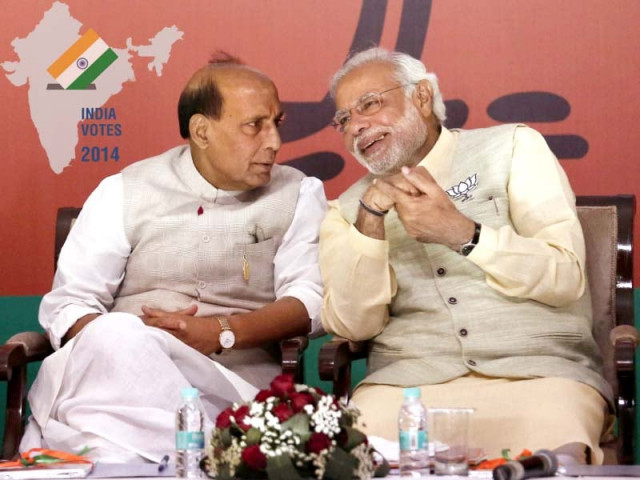India elections: BJP unveils blueprint for governance
Neither party harps upon the threat from ‘across the border’.

Narendra Modi (R) speaks with his party’s president Rajnath Singh before releasing their election manifesto. PHOTO: REUTERS
As voting began in India to elect a new government, the opposition Bharatiya Janata Party (BJP) released its 2014 manifesto, a 52-page booklet outlining the party’s position on economic, social, political and foreign policy issues.
Most pre-election polls indicate that the BJP is likely to get majority in the Lok Sabha, enabling it to form the next government with Narendra Modi as prime minister.
The ruling Congress party came out with its manifesto a few days ago and has jeered at the BJP’s programme, calling it a document heavily derived from the Congress.
But polemic apart, the two manifestoes devote considerable attention to foreign policy, although predictably domestic policy, including economic policies, forms the largest part.
What neither party harps upon is the threat from “across the border”, the usual euphemism for neighbours China and Pakistan. The BJP notes that India ought to remain independent of “big power interests” and “engage proactively on our own with countries in the neighborhood and beyond.”
There is no mention of the United Nations on the list of international fora in which India should take the lead; the focus is instead on the BRICS, G20, IBSA, SCO and ASEM.
Regarding cross-border terrorism, the BJP rather vaguely notes that it would deal with incursions “with a firm hand” and take “strong stand and steps” when the situation calls for it.

It offers a clearer vision on Kashmir – namely that it won’t be conciliatory to Pakistani interests and will maintain the region as “an integral part of the Union of India.”
There is no mention of the Composite Dialogue Process between India and Pakistan.
The defining paragraph in the BJP’s manifesto outlines the BJP’s overall position about India’s place in the world. Decoded, it means the party will not veer away from the Congress-era focus on economic development as the first priority of India’s foreign relations. The manifesto is especially critical of the Congress for allowing India’s leadership in its immediate neighborhood to wane and indicates that the BJP is interested in establishing regional leadership for India in SAARC and ASEAN.
The party pledges to strengthen indigenous defence capability by strengthening the Defense Research and Development Organization (DRDO). It also promises to revisit the Foreign Direct Investment (FDI) caps in defence by allowing domestic defence manufacturers to tie up with foreign defence firms but does not commit itself to how far it will go.
One area where the BJP could potentially alter India’s foreign policy is with regards to India’s strategic nuclear weapons. The manifesto notes that the party would follow a “two-pronged independent nuclear program, unencumbered by foreign pressure and influence, for civilian and military purposes.”
It also notes that the party is interested in revising and updating India’s nuclear doctrine, “to make it relevant to challenges of current times.” Currently, India practices a “no-first use” policy against Pakistan. This is a new addition to this year’s manifesto and did not make an appearance in the party’s 2009 document.
The BJP manifesto abandons the formulaic homage to non-alignment and socialism which the Congress manifesto continues to do. Instead, the BJP wishes to build a web of allies to further India’s national interests.
The BJP also avoids the pitfall of doctrinaire brotherhood with any country or people, unlike the Congress which promises support to Palestine and speaks of the goodwill of socialist countries. The BJP also ignores the issue of a permanent seat on the United Nations Security Council (UNSC), confident that India’s economic and military achievements will more surely bring it the seat than diplomatic hankering alone.
On domestic policy, the two parties promise a better deal for the poor, with targeted subsidies and huge investment for India’s infrastructure.
Published in The Express Tribune, April 8th, 2014.



















COMMENTS
Comments are moderated and generally will be posted if they are on-topic and not abusive.
For more information, please see our Comments FAQ